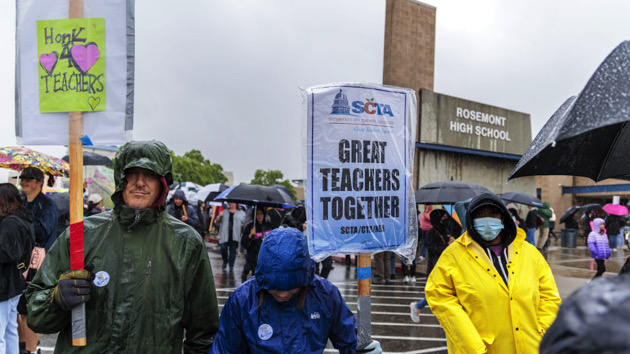Biden calls Russia’s killing of Ukrainian civilians a war crime but not genocide
Written by ABC Audio All Rights Reserved on April 5, 2022

(WASHINGTON) — The killing of Ukrainian civilians committed by Russian forces in Ukraine is a war crime, President Joe Biden said Monday — repeating his accusation that Russian President Vladimir Putin is a “war criminal” who needs to be held “accountable.”
Ukrainian President Volodymyr Zelenskyy accused Russia of “genocide” on Sunday after hundreds of Ukrainian civilians were found killed in Bucha, a suburb of the capital Kyiv that was retaken by Ukrainian forces. Some of the civilians were buried in mass graves, others found dead in the street with their hands tied behind their backs.
“These are war crimes, and they will be recognized by the world as genocide. You are here today and can see what happened. We know of thousands of people killed and tortured, with severed limbs, raped women, murdered children. I think it is more than — this is a genocide,” Zelenskyy told reporters in Bucha Monday.
The U.S. has stopped short of using the term “genocide” because of its strict legal definition and the heavy implications it carries. Asked whether the latest reported atrocities are genocide, Biden told reporters, “No, I think it is a war crime.”
He called again for an investigation and trial, even seeming to suggest that Putin himself should face trial himself.
“We have to continue to provide Ukraine with the weapons they need to continue the fight, and we have to gather all the detail so this can be an actual — have a war crimes trial,” Biden said.
“This guy is brutal and what’s happening with Bucha is outrageous, and everyone’s seeing it,” he added.
While stopping short of labeling it “genocide,” Biden’s call for for a possible war crimes trial raises the pressure on the international community’s response to Russia’s war, which has killed thousands and displaced more than 10 million people in less than six weeks.
Biden said he would seek more sanctions against Putin and his government over the atrocities in Bucha, although it’s unclear if more economic pressure will do anything to bring an end to Putin’s campaign, even as it has shifted away from the Kyiv area to the south and east.
In Bucha and other towns outside Kyiv, the U.S. has also seen “credible reports of torture, rape, and civilians executed alongside their families,” according to State Department spokesperson Ned Price — all of which would be considered war crimes under international law. In southern Ukraine, especially around the besieged city Mariupol, the U.S. is aware of “reports of tens of thousands abducted or deported by Russia’s forces and shocking descriptions of rape, assaults, and murders perpetrated by Russia’s forces,” Price added.
The Kremlin has suggested that the scenes out of Bucha, reported publicly by eye witnesses, reporters, and Ukrainian government officials, were fabricated — a tactic used repeatedly by Russian officials.
Last month, the State Department announced it had made a legal assessment that Russian forces were committing war crimes in Ukraine, including targeting civilians and civilian infrastructure and indiscriminately firing on civilian areas. That assessment was based on public reporting and U.S. intelligence, including intercepted communications between Russian forces, according to U.S. Ambassador-at-Large for Global Criminal Justice Beth Van Schaack.
That could implicate Putin himself, according to Van Schaack, who told reporters it depended on what jurisdiction was hearing cases. Her office at the State Department has continued to document and analyze evidence in preparation for trials.
But while her office also assists in genocide determinations, U.S. officials have so far avoided using the term.
“We have seen atrocities. We have seen war crimes. We have not yet seen a level of systematic deprivation of life of the Ukrainian people to rise to the level of genocide, but again, that’s something we’ll continue to monitor,” Biden’s national security adviser Jake Sullivan said Monday.
Genocide is an attempt “to destroy, in whole or in part, a national, ethnic, racial, or religious group,” according to the Convention on the Prevention and Punishment of the Crime of Genocide, the 1948 treaty that banned it.
It can involve acts of killing or harm, as well as preventing births, forcibly transferring children, or imposing dire conditions that are “calculated to bring about its physical destruction,” per the treaty.
While Russian forces have targeted Ukrainian civilians, including now with executions, it seems that for U.S. officials, the scale is at this point not large enough to prove an intent to destroy the Ukrainian people.
Sullivan used the terms “mass death” and “mass incarceration” and added that if there is “a level of atrocity, a level of killing, a level of intentional activity that rises to meet our definition of genocide, we’ll call it for what it is.”
There are several international investigations underway right now into potential war crimes in Ukraine. The International Criminal Court, which conducts individual prosecutions, launched an investigation in early March, while the United Nations Human Rights Council voted to create a panel of experts to investigate, finally naming its members last week.
The U.S. is also supporting a multinational team of independent war crimes investigators, including American experts, that are working with Ukraine’s prosecutor-general on her office’s probe of Russian war crimes, Price announced.
But while the State Department supports those various investigations, its genocide determinations can take years to complete.
Last month, Secretary of State Antony Blinken announced he had determined that Myanmar’s military had committed genocide against the Rohingya — nearly five years after the Muslim ethnic minority faced a campaign of terror that killed thousands and displaced nearly one million to neighboring Bangladesh.
ABC News’ Molly Nagle contributed to this report from the White House.
Copyright © 2022, ABC Audio. All rights reserved.






